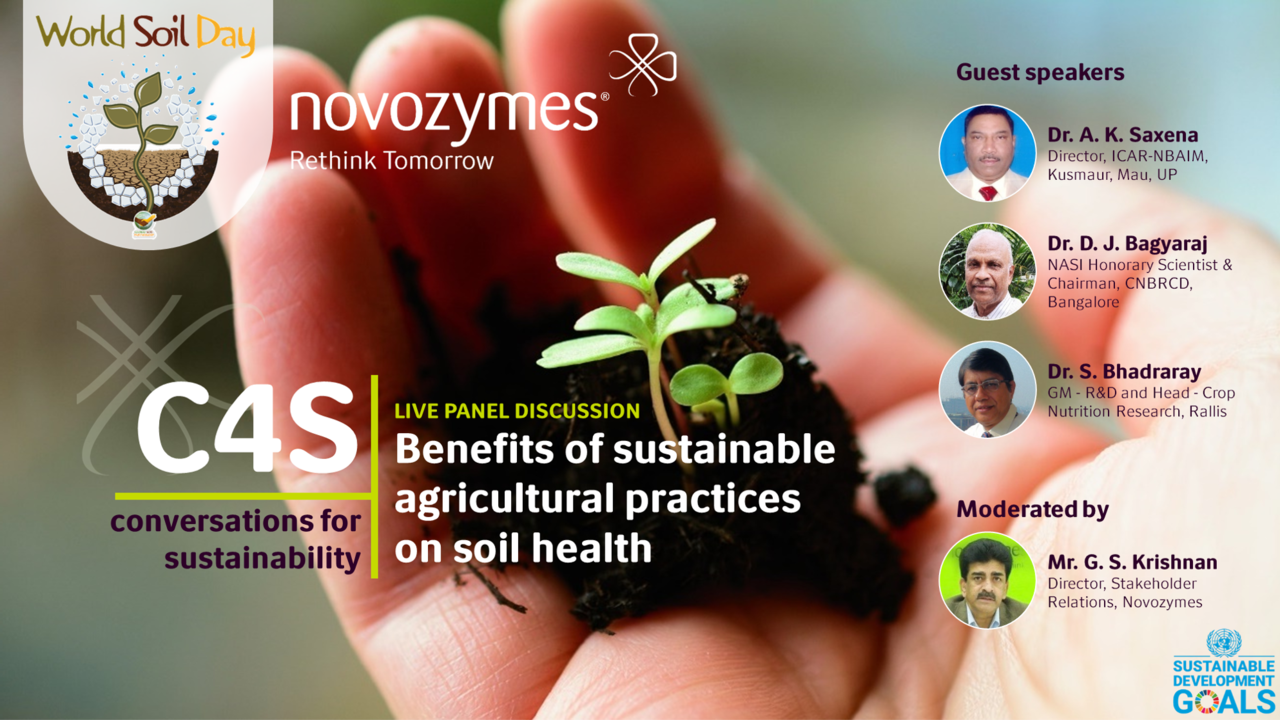Webinar
Benefits of Sustainable Agriculture Practices on Soil Health
On-demand

Agriculture supports half of India’s population and is crucial to its food security. India, certainly, has circumvented the situation of food shortages, thanks to increasing production by our farmers using modern inputs and technology. However, it has come at the cost of the over exploitation of natural resources, primarily, soil. At a time when climate change is posing challenge to agriculture, it is soil which holds the key to unlock the potential to mitigate and adapt in the current situation.
On the occasion of World Soil Day, the Conversations for Sustainability (#C4S) platform from Novozymes is organizing a panel discussion on the theme “Benefits of Sustainable Agriculture Practices on Soil Health”
Who should attend: Industry players, companies in the agricultural space, researchers, & academia interested in sustainable agriculture
Dr. A.K. Saxena
Dr. A.K. Saxena is currently serving as the Director at ICAR- National Bureau of Agriculturally Important Microorganisms, Mau. He joined Agricultural Research Services in 1989 and since then worked in various capacities at ICAR-IARI and ICAR-NBAIM. His major research interests are in the area of plant–microbe interactions and molecular diversity analysis of bacteria. He successfully transferred the microbe-based technologies to entrepreneurs, leading to increased coverage of land under microbial inoculants. Dr. Saxena has to his credit more than 200 Research publications and 38 book chapters. He has won several awards and was elected as fellow of National Academy of Agricultural Sciences, Academy of Microbiologists of India and Indian Mycological Society.
Dr. D. J. Bagyaraj
Dr. Bagyaraj is a renowned scientist currently functioning as NASI Hon. Scientist & Chairman at CNBRCD, Bangalore. He is also the advisory committee member of various Government bodies such as ICAR, DST, DBT, CSIR, UGC, Rubber Board and also some of the International organizations such as AICAR (Australia) EU, Spices Board, IFS (Sweden), FAO, UNEP/ GEF. He has been conferred with numerous national awards and lifetime achievement awards, including S. R. Vyas Memorial Award and Dr. G Rangaswami Memorial Award. He was also the only Indian Scientist invited by European Commission to author the chapter on mycorrhizal fungi for the Global Atlas on Soil Biodiversity released in May 2016 at Brussels, Belgium. For his tremendous contributions to the agriculture field, he has been honored by naming a new Mycorrhizal fungus after him, Glomus bagyarajii.
Dr. S. Bhadraray
Dr. Subhendu Bhadraray has been associated with many reputed Institutes both in India and Malaysia such as IARI, New Delhi; Tata Chemicals, Aligarh; Yara Fertilizers, Agra; Kajang, Malaysia, where he has impacted the agricultural sector vastly. For his contributions to develop a Business Delivery Model for Agri-input Management Service (Smart cluster), he has been conferred with Dhirubhai Morarji Memorial Award. He also functioned as an Advisory committee Member at FAI. Dr. Subhendu Bhadraray is a pioneer in developing research protocols for commercialization of several crops in India Along with all these credits, he also has published several articles, seminar papers, technical bulletins & a book.
Mr. G. S. Krishnan
Mr. G S Krishnan is an experienced thought-leader in the Industrial Bio-tech Segment propagating Sustainable solutions across the SAARC countries with Global market exposure. He has in-depth knowledge and vast experience in overall Strategy and General Management capabilities in a multinational environment, with a total tenure spanning more than 35 years. After a 27 year tenure at Novozymes South Asia Pvt. Ltd, majority of the role as Managing Director and Regional President, he is now engaged as Independent Director, Advisor/Consultant, and Leadership Mentor across the Industrial segments. He is also serving as the President of ABLE (Association of Biotech Led Enterprise) and a member of CII Bioenergy Committee. He has participated as a speaker at “ECOSOC” at the United Nations, propagating Sustainable Development Goals of Novozymes.
